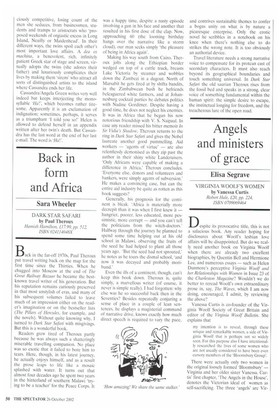Angels and ministers of grace
Elisa Segrave
VIRGINIA WOOLF'S WOMEN by Vanessa Curtis Robert Hale, £20, pp. 224, ISBN 0709069464 Despite its provocative title, this is not a salacious book. Any reader hoping for disclosures about Woolf s lesbian love affairs will be disappointed. But do we really need another book on Virginia Woolf when there are already two excellent biographies, by Quentin Bell and Hermione Lee, and numerous essays — such as Helen Dunmore's perceptive Virginia Woolf and her Relationships with Women in Issue 23 of the Charleston Magazine? Wouldn't we do better to reread Woolfs own extraordinary prose in, say, The Waves, which I am now doing, encouraged, I admit, by reviewing the above?
Vanessa Curtis is co-founder of the Virginia Woolf Society of Great Britain and editor of the Virginia Woolf Bulletin. She explains that
my intention is to reveal, through these unique and remarkable women, a side of Virginia Woolf that is perhaps not so widely seen. For this purpose also I have intentionally researched the lives of some women who are not usually considered to have been even cursory members of the 'BloomsburyGroup'.
There were actually only two women in the original loosely formed 'Bloomsbury' — Virginia and her older sister Vanessa. Curtis' first chapter, The Angels in the House', denotes the Victorian ideal of women as self-sacrificing. The three 'angels' are Vir ginia's grandmother Maria, her mother Julia. and her half-sister Stella Duckworth. Curtis, confusingly, depicts 'angel' Maria as a hypochondriac making demands on her daughter. Maria died when Virginia was ten. Three years later, Virginia lost her mother Julia, which precipitated her first breakdown. Curtis is right to emphasise the lasting effects of that bereavement and the ones that followed — Stella died two years later, leaving Vanessa as surrogate mother to her three younger siblings, Virginia, Thoby and Adrian. In 1904 their father Sir Leslie Stephen died and in 1906 Thoby, Virginia's favourite brother, of typhoid fever. Four months later Vanessa married Clive Bell, thus depriving Virginia of her closest companion, although they remained intimate — it was to Vanessa that Virginia addressed one of her two suicide notes. (The other was to Leonard Woolf who, surely, was the real 'angel in the house', devoting himself to the care of his fragile, talented wife.) The other women that Curtis chooses besides Vanessa, 'robust, earthy and Madonna-like', are Violet Dickinson, Ottoline Morrell, Katherine Mansfield, Dora Carrington, Vita Sackville-West and the lively Ethel Smyth, composer and suffragette. Mansfield and Morrell share a chapter, though they have little in common apart from Virginia's fluctuating attitudes to each. I was fascinated by Woolf's relationship with Mansfield, a mixture of competitiveness and admiration for a fellow female writer who also took her craft extremely seriously. Curtis interestingly quotes some descriptive passages by both. The writing is, as she maintains, surprisingly similar, although I would say that Mansfield's prose is more sensuous.
Curtis's own style couldn't be less like that of her subject. Woolf is poetic, versatile and brilliant, whereas Curtis can be pedestrian. She tends to state the obvious and the reader does not always feel on safe ground.
In the chapter on Violet Dickinson — she emphasises the maternal role Violet played in Virginia's life, although apparently they also sometimes shared a bed — she relates how, for several weeks after Thoby's death, Virginia wrote Violet letters pretending that he was still alive, implying that this odd behaviour was another example of Virginia's instability. However, Quentin Bell writes that Virginia was ordered to conceal Thoby's death because Violet was ill and the shock might have affected her recovery.
Similarly, Curtis seems unsure of where she stands on the alleged constant sexual abuse of Virginia by her older half-brother George Duckworth, sometimes taking it seriously, then not. She writes that in later years Virginia and Vanessa 'even went on holiday with both Duckworth brothers, unlikely behaviour from the victims of any serious sexual abuse'. This seems naive. Contrast Woolf's own words from her memoir '22 Hyde Park Gate' (her child
hood home) in the recently reprinted Moments of Being:
Sleep had almost come to me. The room was dark. Someone entered. 'Who?' 1 cried. 'Don't be frightened.' George whispered. 'And don't turn on the light, oh beloved. Beloved —* and he flung himself on my bed, and took me in his arms.



















































































 Previous page
Previous page